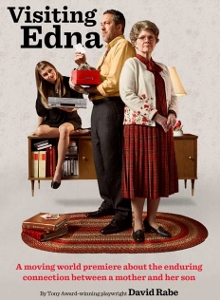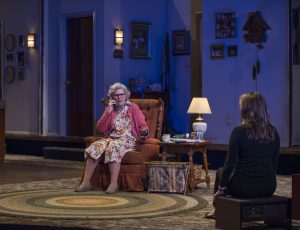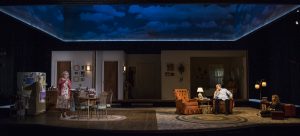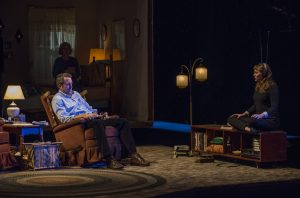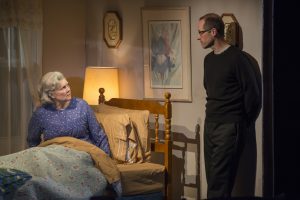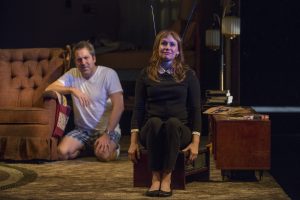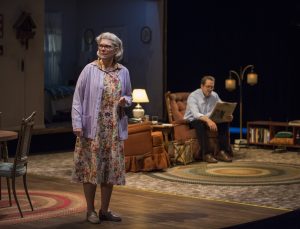LETTING GO, NOT GIVING UP
This is a long and leisurely play that generically examines the leaving of life–as in how, when, why and where to say goodbye. Steppenwolf Theatre Company’s world premiere Visiting Edna, by Tony-winning David Rabe (author of the Vietnam War saga Streamers), is a major debut for the Tony-winning troupe to launch its 41st season. It’s also a test to measure an audience’s desire to listen and learn.
Like such slow-paced, steady-state Steppenwolf shows as Mary Page Marlowe, The Flick and The Herd, it takes its time to cast its spell. And it’s not, to quote the Bard, for all markets. Slow and static, Rabe’s five-character work is a quirky mix of achingly familiar realism, expressionistic allegories, and presentational stagecraft (such as apostrophes to the audience). His hard-to-label drama seems engulfed in domestic details, then suddenly surges into the surreal.
But the unassuming title, Visiting Edna, is accurate to a fault. We’re placed in the title character’s modest, knickknack-ridden apartment in the Midwest during the 1990s, looking back more than forward. That’s because 78-year-old Edna (Debra Monk), wearing a colostomy bag and suffering from congestive heart failure, diverticulitis, diabetes, bad knees, arthritis, and now an unspecified cancer, is on the edge of extinction.
Confronted with a host of last or lost chances, Edna is winding down like her cuckoo clock. She’s also winding up her life, disposing of a lifetime of photos, family albums that now leave her depressed. Her son Andrew, much closer to life, can’t understand how she can relinquish these pictorial memories.
The only other real person here is that middle-aged son. Andrew (Ian Barford) has crossed the country to confront his mother’s cancer crisis. Their conversation is the action (such as it is). It’s viewed over several days and nights, amid thunderstorms (with real rain), small talk, and the viewing of videos. Interrupting the visit is a curiously refreshing auto trip to Iowa City, taken in the vain hope for a special cure. It binds the loved ones as the past never did.
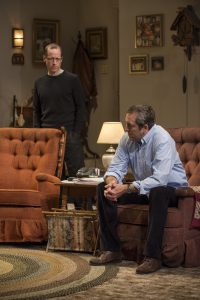 Their long encounter deals with much unfinished business and some that can’t be completed. Desperate to live, Edna nonetheless refuses to give in to her late husband’s fantasies of unexpected rescues, strangely triggered by the stories of Edgar Allan Poe. Occasionally mother and son, almost formal in their stilted conversations, abruptly lapse into baby talk, no doubt an old device to minimize misery.
Their long encounter deals with much unfinished business and some that can’t be completed. Desperate to live, Edna nonetheless refuses to give in to her late husband’s fantasies of unexpected rescues, strangely triggered by the stories of Edgar Allan Poe. Occasionally mother and son, almost formal in their stilted conversations, abruptly lapse into baby talk, no doubt an old device to minimize misery.
We eavesdrop on family gossip about a dad who was distant before he was dead, exposition about the fatal accident that left Edna’s husband Teddy abandoned in the woods with a broken neck, Edna’s estrangement from her jealous, now dead, sister Madeline, her glimpses of a ghostly Teddy walking through the apartment, Edna’s continued regret over the loss of her sole confidante Tessa, muted accusations of child abuse, and Edna’s worries over why her loved ones don’t visit her until she’s dying. There’s also an allusion to a haunting memory of a six-year-old Andrew, in 1946, being taken in the dead of night to watch a fatal fire at the Whitfield Hotel.
Much like the return of a dead Emily Webb to her 12th birthday in Our Town, Rabe employs small-scale storytelling to expose just how much the living take for granted, even when faced with endless separation. In the most bizarre development of all, Edna and Andrew regularly converse with Actor One (Sally Murphy), who literally portrays the all-distracting T.V. set. “It” is both eager to enable Edna’s denial and to connect the living people through beloved films. Even more improbably, Actor Two (Tim Hopper) plays Edna’s cancer. Ironically, this dark personage wants Edna to live so it can. But, stolidly pronouncing doom, it also warns her to face the inevitable, to forget worrying about what doesn’t matter anymore anyway, and to put her soul in order.
Strangest of all, Actor Three (Michael Rabe—David Rabe’s son with Jill Clayburgh) appears briefly and horrifically in a shared dream: He erupts as the Angel of Death, there to literally whip the religious Edna into submission to eternity. The drama ends as unobtrusively as it progressed, with Andrew’s winsome regret and two versions of Edna’s departure. You can choose which you like.
Director Anna D. Shapiro maintains a sure hand through this onslaught of memory-mongering. It’s not easy to make Visiting Edna even marginally entertaining: Edna’s valedictory could almost furnish a manual for dying. (As such, this play is not for the easily depressed.) Barford keeps a fascinating balance between Andrew’s too-tested frustration with his addlepated mother and his urgent yearning for some kind of conditional finality. (Inevitably, Murphy’s T.V. and Hopper’s cancer both set new standards for never-seen roles. But Rabe’s stentorian angel/reaper—a very weird dream indeed–could trigger inappropriate laughter as much as intentional shock.)
Admirably, this nearly three-hour Visiting Edna respects an audience’s attention span as it demands a kind of dogged patience that’s not always rewarded by the revelations. But the sheer ordinariness and unpretentious straightforwardness of this very representative tale amount to a cumulative virtue. There’s nothing flashy or phony on this sprawling Steppenwolf stage (perfectly pictured by David Zinn). We just visit Edna.
photos by Michael Brosilow
poster photo by Saverio Truglia
Visiting Edna
Steppenwolf Theatre Company
Downstairs Theater, 1650 N Halsted St
ends on November 6, 2016
for tickets, call 312.335.1650 or visit Steppenwolf
for more shows, visit Theatre in Chicago
